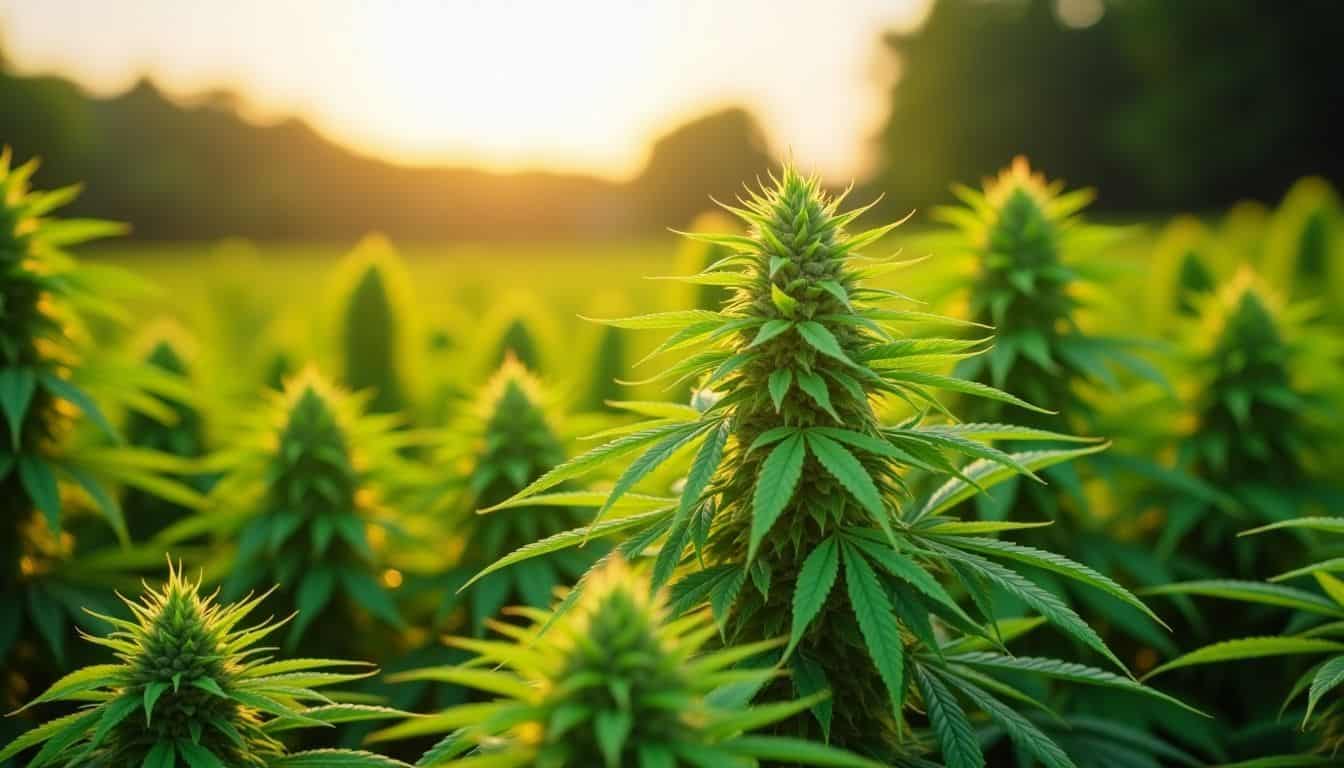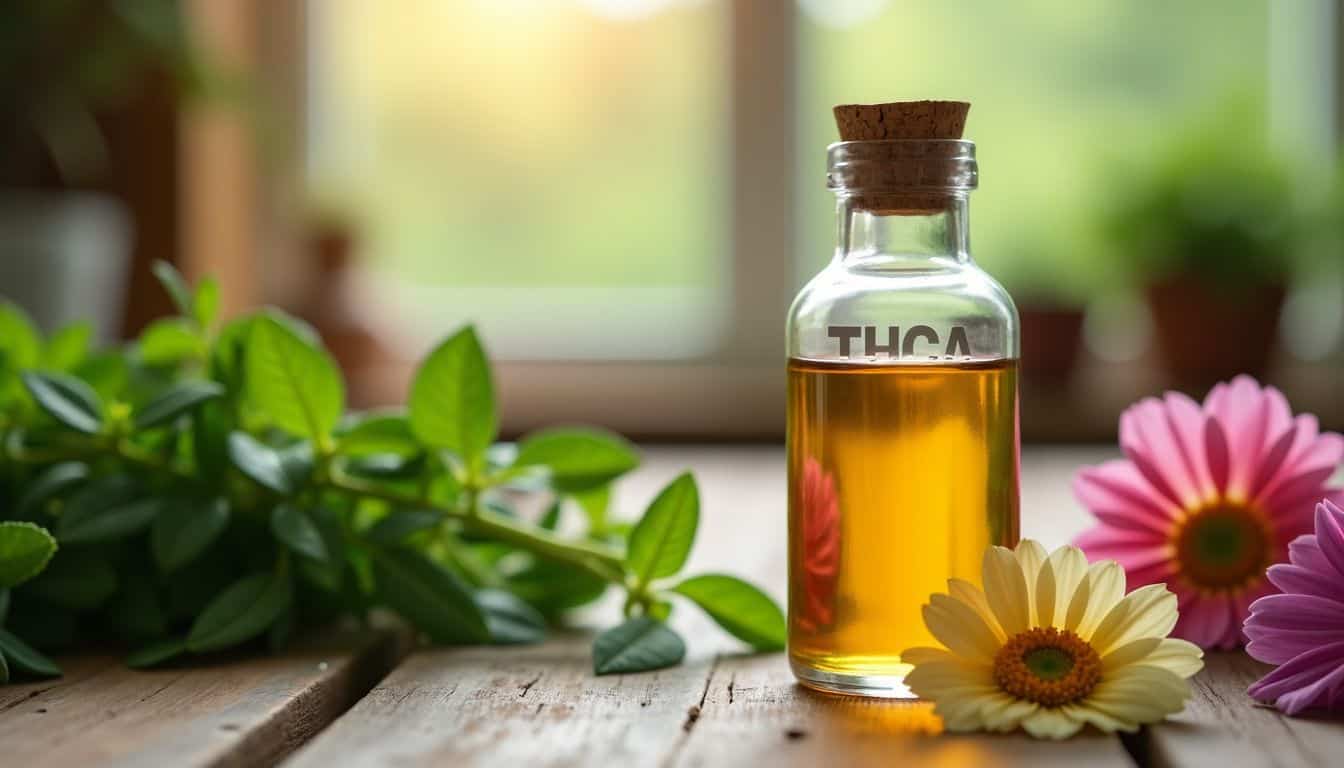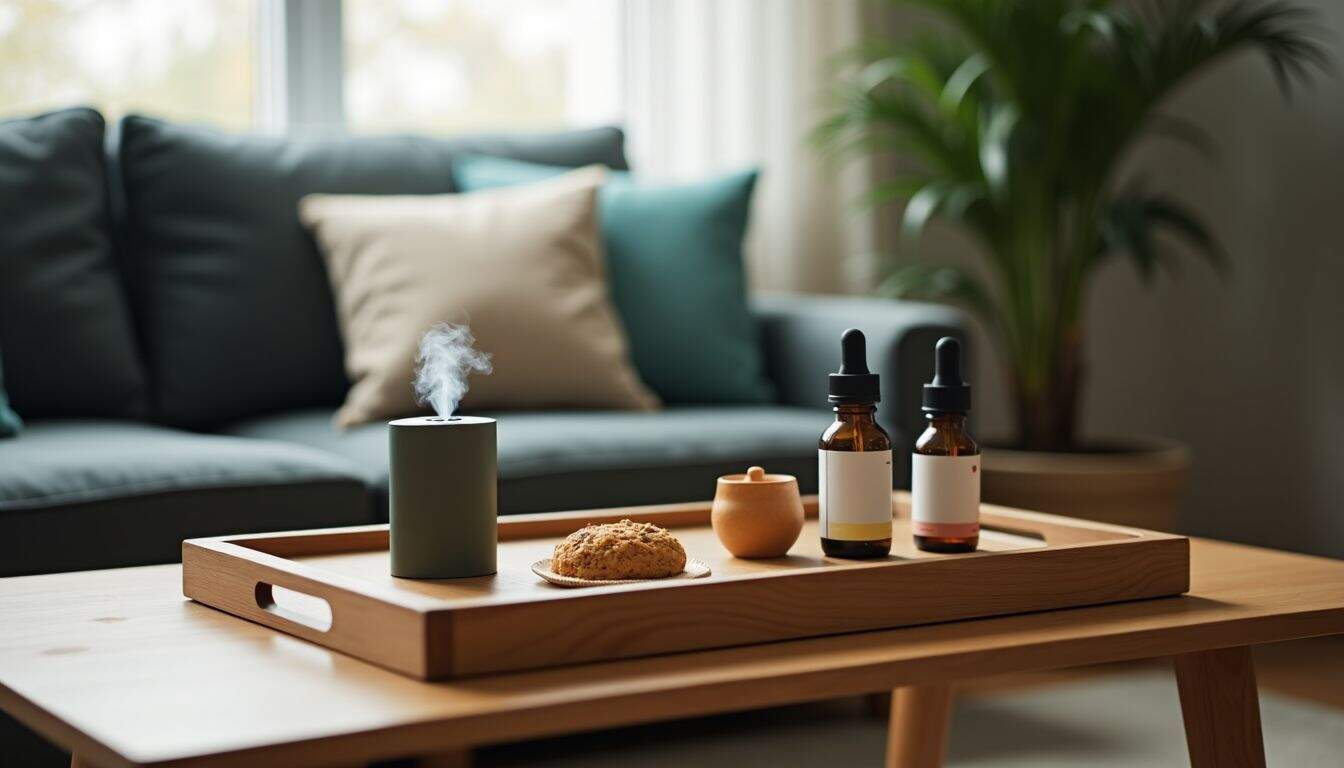Do you struggle with aches, inflammation, or stress and wonder, “What are the benefits of using THCA?” Tetrahydrocannabinolic acid (THCA) is a non-psychoactive compound in raw cannabis that might reduce discomfort without making you feel high.
In this post we’ll clearly discuss six practical ways THCA could help—like nausea relief, calming support for your mind, and ease from seizures. Read on to learn how THCA may boost your health in 2025.
Key Takeaways
THCA is a cannabis compound that won’t get you high unless heated. It can ease pain, inflammation, nausea, seizures, and boost mood without psychoactive effects (National Institute on Drug Abuse study).
A 2017 study in Italy and Spain showed that THCA has neuroprotective properties which improved motor skills in mice with conditions similar to Parkinson’s disease.
Common ways to use THCA include tinctures, edibles like gummies or smoothies, topical creams for muscle soreness relief after workouts, and vaping products for quick symptom relief lasting around 3–6 hours.
Dosage matters: beginners should choose products below 20% THCA content to limit side effects; always pick third-party tested items for safe results.
In the United States by federal law (2018 Farm Bill), hemp-derived products with less than 0.3% delta-9 THC are lawful—but laws vary between states. Check local rules often to avoid legal issues.
Table of Contents
What Is THCA?

Now that we’ve covered the basics, let’s talk about tetrahydrocannabinolic acid—or THCA for short. THCA is one of over 100 cannabinoids found in cannabis plants and comes directly from CBGA (cannabigerolic acid), known as the “mother of all cannabinoids.” Unlike delta-9 THC, which triggers psychoactive effects through CB1 receptors in your body’s endocannabinoid system, THCA has an extra molecular carboxyl ring—so it won’t get you high until exposed to heat.
Heat exposure happens with smoking or vaping raw cannabis flower, cooking edibles, or even with vape cartridges and dabbing. This action—called decarboxylation—turns THCA into delta-9-tetrahydrocannabinol (THC).
Many people enjoy taking THCA for its possible health benefits without the addictive high linked to recreational marijuana use disorder. It’s popular with men seeking anti-inflammatory support or relief from discomfort linked to soreness and chronic conditions like inflammatory bowel disease.
Some prefer taking pure forms such as this Best THCA Live Resin instead of conventional medical marijuana products due to accurate lab results provided by third-party lab testing—without pesticides or harmful chemicals commonly seen in low-quality cannabis strains.
THCA provides many benefits without causing a psychoactive high—that means relief minus fuzziness.
THCA vs. THC

Understanding the differences between THCA and THC helps you choose wisely for your needs.
| Feature | THCA | THC |
|---|---|---|
| Psychoactive Effects | No psychoactive effects – does not cause a “high” sensation. | Produces psychoactive effects – causes relaxation or euphoria. |
| Interaction with CB Receptors | Does not bind directly to CB1 receptors, reducing intoxication. | Binds directly with CB1 and CB2 receptors in the brain, causing psychoactive sensations. |
| Conversion Process | Converts into THC through decarboxylation (heat exposure). | Already activated compound, needs no conversion. |
| Ideal Uses | Preferred for therapeutic uses—such as discomfort relief, anti-inflammation, and seizure management—without intoxication. | Chosen primarily for recreational experiences and mental relaxation. |
| Typical Consumption Methods | Often used in raw forms or via tinctures, topicals, and low-heat edibles to prevent THC conversion. | Commonly consumed through smoking, vaping, high-heat cooking methods, and potent edible products. |
Understanding these distinctions sets the stage for exploring the specific health advantages THCA provides.
Benefits of Using THCA

Using THCA can support your mind and body in surprising ways, changing how you think about cannabis—so keep reading to discover why more men are making it part of their routine.
Neuroprotective properties

THCA shows strong neuroprotective effects, helping your brain stay healthy and sharp. A 2017 study from researchers in Italy and Spain found that THCA boosted motor skills in mice with issues similar to Parkinson’s disease—suggesting it might help humans facing neurodegenerative diseases like Alzheimer’s or dementia.
Scientists also learned THCA works as a potent PPARγ agonist; this means it enhances mitochondria growth, lowers harmful inflammation markers, and stops damaging reactive gliosis within the brain tissue.
In fact, I’ve personally felt clearer focus after trying vaping THCA through a vape pen instead of smoking weed with a bong—a calmer mind without feeling overly dope or addicted.
Curious about more ways it can soothe your body? Let’s check out its anti-inflammatory effects next!
Anti-inflammatory effects

Inflammation plays a big role in chronic illnesses, like arthritis or diabetes. Research shows that THCA Live Resin by Vivimu has strong anti-inflammatory effects and may help ease inflammation-linked discomfort.
Men who want the benefits of cannabis products without the high—like those with physically active lifestyles—can use THC A since it’s non-psychoactive. Studies on cannabinoid receptors and our endocannabinoid systems are ongoing to fully grasp these medical uses, but early results look promising for pain relief without intoxication.
Discomfort relief

THCA can ease chronic pain without making you feel high—unlike THC or delta-9-tetrahydrocannabinol. Studies show THCA might provide analgesic effects, helping manage chronic aches from conditions like arthritis and Crohn’s disease.
Men dealing with ongoing discomfort could find this natural option better than regular medications or drugs because it doesn’t carry the common risks linked to recreational cannabis use.
THCA offers relief without the buzz, making daily life easier.
If nausea is also a concern, especially after chemotherapy sessions, animal tests indicate THCA may cut down feelings of sickness while providing comfort. Ready for more soothing perks? Let’s move on to nausea alleviation.
Nausea alleviation

Relief from discomfort goes hand-in-hand with easing nausea, which is another big benefit of consuming THCA. Studies by the National Institute on Drug Abuse confirm THCA offers anti-nausea properties.
You won’t get “high” when taking raw THCA through edibles or food supplements—even though it comes from hemp and cannabis plants. Many men dealing with nausea—such as those going through harsh treatments that often lead to vomiting—find relief in adding raw THCA into their diets, like sprinkling powdered forms onto meals or drinks such as lime soda.
Just a heads up: Smoking or vaping THCA converts it to THC (delta-9 tetrahydrocannabinol), causing psychoactive effects similar to when you smoke weed. So if mental clarity matters while managing nausea symptoms, stick with unheated methods like edible marijuana products containing fresh-form extracts rich in cannabidiolic acid (CBDA) and cannabidiol (CBD).
Budtenders at dispensaries can help choose low-heat options best suited for medicinal uses without unwanted highs.
Positive mental support

THCA may help ease symptoms of anxiety and depression for many men. Users often report feeling more relaxed and calmer after trying THCA flower, noting clear stress relief. The compound works by interacting with your body’s endocannabinoid system to help balance mood patterns—even lifting emotional stability due to its anti-inflammatory properties.
Studies in cannabis research also suggest an “entourage effect,” meaning that combined elements within the plant may boost your overall mental health. As interest grows around managing mental health issues like depression and anxiety, THCA use might offer promising results worth exploring.
Beyond boosting mood, other serious conditions like seizures can respond well—here’s how seizure management comes into play with THCA usage.
Seizure management

Managing seizures can be tough, but cannabis offers support through its compound known as THCA. A 2017 study showed it has anticonvulsant effects, which may help ease seizure episodes just like Epidiolex does.
To keep things safe and effective, start with low doses—this helps you gauge how your body reacts without the worry of unwanted side effects. For men dealing with epilepsy or similar conditions, using products like tinctures or edibles that contain cannabidiolic acid (CBDA) along with THCA might also enhance relief.
Aside from mental comfort and oxidative stress control, cannabis products rich in THCA add extra protection to your brain cells. Those neuroprotective perks could lower risks linked to disorders such as Parkinson’s disease or Alzheimer’s disease while helping reduce seizures too.
Still unsure? Check local rules on lawful possession before vaping or smoking THCA—or even using delta-8 THC—to steer clear of issues involving the Drug Enforcement Administration (DEA).
Methods of Using THCA

Using THCA can fit easily into your daily life, with a choice of methods to match any routine. Each method has its own unique feel and effect—so choose the one that fits your needs best.
Smoking
Smoking THCA flower means heating it to trigger decarboxylation, which changes THCA into THC. Common ways men enjoy smoking include pipes, joints, blunts, and bongs. Quality cannabis strains will differ—genetics and curing methods shape how good the smoke feels and tastes.
Terpenes found in the flower add unique flavors and aromas when smoked; a citrus aroma signals terpene limonene while pine notes come from pinene. Smoking is fast-acting but carries some health risks for your lungs; be careful if lung health is an issue or you recently visited a drug rehab clinic.
Next up are vaping methods—which offer another way to get positive effects of cannabis without heavy smoke exposure.
Vaping
Unlike lighting up, vaping gives you a smoke-free way to consume cannabinoids like THCA and delta-9-THC. Users can choose from handy cartridges, disposable vape pens, or vapor-ready flower strains—like indica for calmness, sativa for positive mental support, or hybrid blends offering balanced relief from discomfort and nausea alleviation.
Effects kick in fast—in about 30 minutes—and usually stick around 3–6 hours depending on dosage.
With vaping THCA products, you’ll sidestep harsh smoke that might irritate your lungs while still getting swift access to therapeutic benefits including anti-inflammatory effects helpful with Parkinson’s disease or Alzheimer’s disease symptoms.
You get easy-to-use gear, quick activation time without having to wait long hours (unlike edibles), plus clear dosing control—a solid choice for medicinal purposes where precise intake matters most.
Before diving deeper though—check the laws on THCA legality in your own area so you stay within state guidelines.
Edibles
Edibles offer an easy and tasty option for taking THCA, free from smoke or vape. Due to its low psychoactive content, THCA flower can safely be put into treats like gummies and brownies—or eaten fresh in salads and smoothies—to provide discomfort relief or nausea alleviation without feeling overly buzzed.
High-quality products have driven strong market growth; by 2025, experts expect the demand for safe and tasty THCA-infused snacks to rise sharply among men interested in medical purposes.
Popular edibles may also include cannabidiolic acid (CBDA) blends providing extra anti-inflammatory effects that help ease symptoms tied to Parkinson’s disease and Alzheimer’s disease.
Tinctures
If edibles don’t quite suit your needs, tinctures offer a simple alternative—you just place a few drops under your tongue and feel quick effects. Tinctures provide controlled and consistent consumption, which makes dosing easy—perfect if you use THCA for nausea alleviation or anti-inflammatory effects.
Store these liquids in cool, dark areas to keep potency strong over time. Alongside their ease of use, tinctures can also enhance therapeutic benefits like neuroprotective properties—which may support brain health linked to Alzheimer’s disease or Parkinson’s disease—or relief from feeling nauseous without the high associated with delta-8-tetrahydrocannabinol (delta-8 THC).
Topicals
Topicals are creams, balms, and lotions infused with THCA. They deliver targeted relief right where you apply them—without any psychoactive effects from THC or delta-8 tetrahydrocannabinol (delta-8-THC).
From personal experience: after a tough workout, a balm with THCA helps ease muscle soreness fast. Proper storage matters for keeping topicals fresh and their potency strong; keep them away from heat and direct sunlight.
These topical products work great if you’re dealing with inflammation discomfort or even specific health concerns like joint pain in Parkinson’s disease or Alzheimer’s disease. Some blends combine THCA with other helpful plant acids, such as CBDA (cannabidiolic acid), to boost anti-inflammatory effects.
They’re versatile options for men seeking focused non-psychoactive solutions: simple to use anytime at home or on-the-go—and easy on your body too.
Factors to Consider When Using THCA

Getting started with THCA means knowing what’s best for your body and staying safe. Keeping a close eye on key details helps you enjoy THCA with ease and confidence.
Dosage
Dosage matters a lot with THCA. Beginners should start low, choosing products with less than 20% THCA to limit side effects and boost therapeutic benefits like nausea alleviation or appetite stimulation.
Higher levels of THCA—over 20%—mean increased potency after the plant decarboxylates (losing its “COOH” group), turning into THC. Potency affects how strongly you feel relief from discomfort or get support for conditions like Alzheimer’s disease or Parkinson’s disease, yet too high an amount may cause unwanted reactions.
To pick a safe dose, always check product labels carefully—strength counts.
Next up is understanding why the quality of your chosen product truly counts in achieving the best outcomes.
Quality of product
Choosing the right dose is key, but so is product quality. Product strength and purity depend on genetic strain, growing conditions, and careful storage of THCA flower. Third-party lab tests confirm safety and provide clear terpene profiles—these boost your experience with positive mental support or relief for Parkinson’s disease symptoms.
I have tried different THCA items myself: weaker genetics yield weak effects; poor storage means less potency. Strong strains grown well give real benefits like easing inflammation or soothing discomfort linked to Alzheimer’s disease.
Always seek third-party tested products to get genuine results from THCA use in 2025.
Legality in your area
High-quality THCA products can’t help you much if they’re not legal in your state. Federal law, under the 2018 Farm Bill, classifies hemp-derived THCA flower as legal only if it has less than 0.3% delta-9 THC.
Yet rules vary widely from one state to another—Texas may approve of it while Idaho might disagree. Local laws are changing fast, too; what was banned last year might become lawful this year or next.
You need to regularly check your state’s current cannabis and THCA regulations so you stay clear of trouble while using THCA for issues like Alzheimer’s disease or Parkinson’s disease symptoms.
How Will THCA Evolve in 2025?

THCA in 2025 will have more variety and options for men who want high-quality THCA flower products. Leading companies like AREA 52, FINEST LABS, SECRET NATURE, HEMP GENERATION, and ARETE HEMP plan to put out new strains that focus on potency and flavor.
Strain types will differ greatly—each with specific aromas and appearance designed to attract buyers who seek the best of quality and brand reliability. Potency testing standards could improve as more users look closely at strength as well as clear product descriptions for consumer confidence.
Brand reputation and trust from consumers might become central points in market competition. In 2025, businesses are likely to pay careful attention to customer reviews online—showcasing user satisfaction clearly—and use simple labels that help people easily choose what meets their needs.
Dosage guidance may also get clearer over time—inspired by how easy it is today for men looking into the benefits of CBD oil.
As consumer knowledge grows around THCA’s positive effects such as reduced discomfort or seizure control—the demand should rise steadily too—which means higher production standards across all brands involved.
People Also Ask
What exactly is THCA, and why should I consider using it in 2025?
THCA is a natural compound found in cannabis plants that offers several health perks—like easing inflammation, reducing stress, and supporting restful sleep. In 2025, more people will turn to THCA for its gentle yet effective benefits.
Can THCA help me manage daily stress levels effectively?
Yes! Using THCA regularly can lower your body’s stress response naturally. It helps you feel calmer throughout the day without causing unwanted side effects or making you sleepy.
Will taking THCA improve my sleep quality at night?
Absolutely—it promotes deeper rest by calming your mind and body before bedtime. Many users report waking up refreshed after adding small amounts of THCA into their nightly routine.
Is it safe to use THCA every day as part of my wellness plan?
Definitely! When used responsibly—and following recommended guidelines—THCA provides consistent support for overall well-being with minimal risks or drawbacks involved.
References
- https://www.sheboygansun.com/thca-101-effects-benefits–8-best-products-to-buy/article_176ab4cc-fb9c-11ef-af02-f3bfb368a950.html
- https://canvastsupplyco.com/blogs/news/thca-vs-thc?srsltid=AfmBOoroHwTgFNdWrErUAfmX6070vKPaXHO-GK2OdWhKw4SXxEz4uhPN
- https://pmc.ncbi.nlm.nih.gov/articles/PMC5731255/
- https://www.hempies.co/what-is-thca-and-the-benefits/ (2022-12-18)
- https://www.webmd.com/mental-health/addiction/what-is-thca (2024-04-15)
- https://healtreatmentcenters.com/mental-health/thca-flower-benefits-uses-and-effects/ (2025-02-21)
- https://aretehemp.com/thca-flower-the-ultimate-guide-2025/
- https://www.cbdivine.com/guide-to-using-thca-vapes-efficiently/ (2024-02-26)
- https://www.riponpress.com/cannabis/understanding-thca-benefits-legality–8-best-sources/article_f1bfdfbe-f613-11ef-b563-cf4a2eaa959a.html (2025-02-28)
- https://9realms.eu/blogs/news/how-to-use-thca-tinctures-guide?srsltid=AfmBOoqvL7RGymjpubHMXMODSZL3qoEfj9DoKXdoRomh62bpSGZ11C_0 (2025-03-20)
- https://www.samessenger.com/the-ultimate-guide-to-choosing-thca-flower-in-2025/article_f4d9001c-75f4-11ef-b762-83422c2853a1.html

